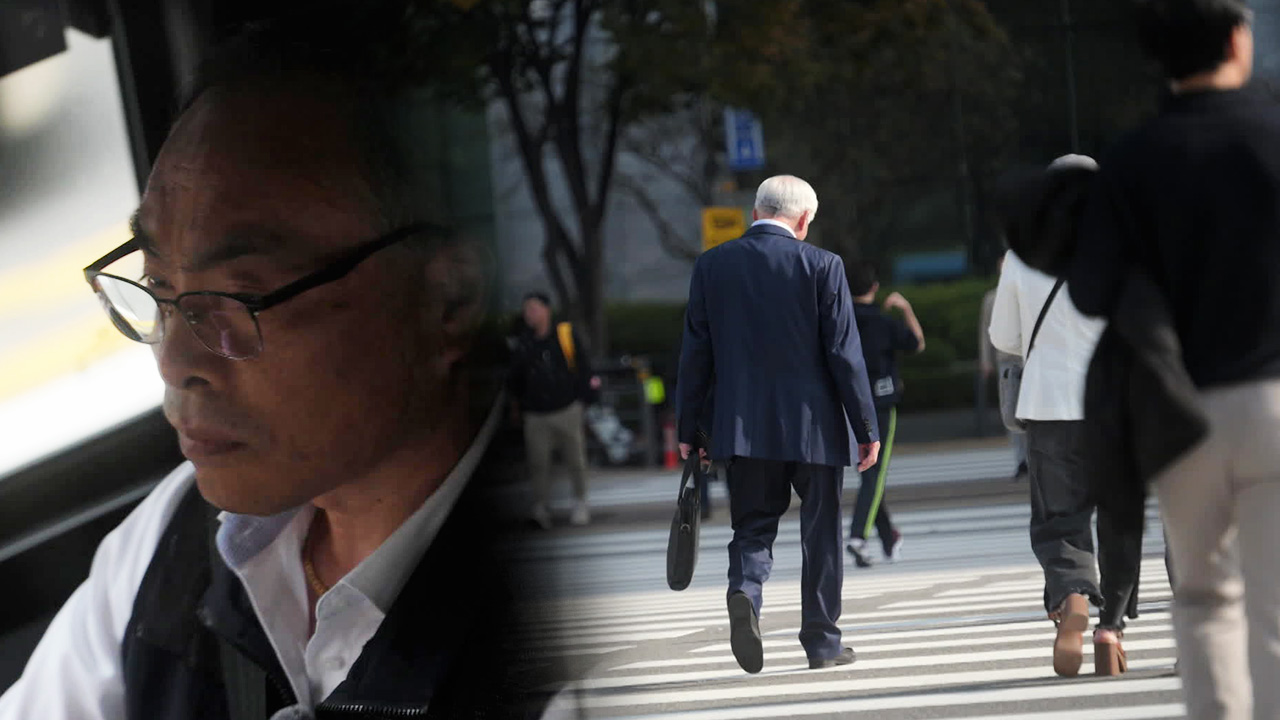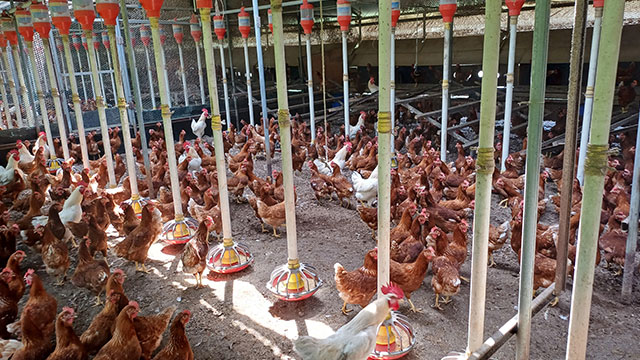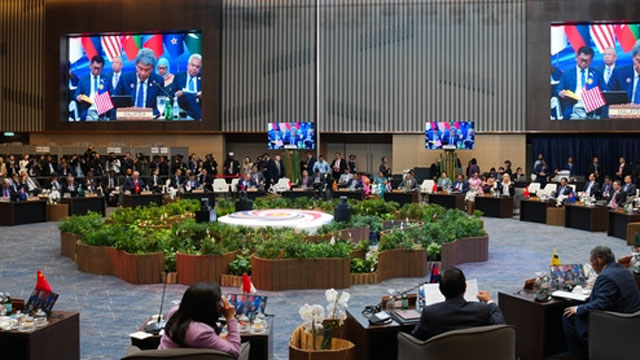Discussions to be held on national pension reform to resolve income gap after retirement
입력 2024.11.04 (01:26)
읽어주기 기능은 크롬기반의
브라우저에서만 사용하실 수 있습니다.
[Anchor]
Starting next year, the retirement of the second generation of baby boomers will begin in earnest.
However, they will face an income gap for up to five years before receiving their national pension after retirement.
This is a very serious issue.
As a result, voices calling for an extension of the retirement age are growing louder.
Reporter Kang Naru will tell us how far the discussions have progressed.
[Report]
[“See you in the evening.”]
62-year-old Hong Wang-ki is responsible for his wife's commute after retiring from the bank.
7 million people of the first generation of baby boomers, like Mr. Hong, have passed the retirement age of 60 last year.
Starting this year, the retirement of the second generation of baby boomers, which is 2.5 million more people than the first, will begin.
Many of these individuals will face what is known as an 'income cliff' until they start receiving their pensions after retirement.
[Kim Hyun-seok/60 years old: “I don’t think there are many people who are prepared for their retirement. The same goes for me.”]
Since the pension reform in 1998, the age for people to start receiving their benefits has gradually increased, and from 2033, individuals will need to be 65 years old to receive their pensions.
Currently, those aged 55 and born in 1969 or later will experience a five-year income gap.
Given this situation, there have been recent agreements between labor and management to extend the retirement age in some workplaces, including public officials.
[Kim Ho-seong/63 years old: “This is the time when expenses are the highest. Children are adapting to society and getting married.”]
The labor sector is demanding that the retirement age be explicitly set at 65 through legislation.
[Kim Jong-jin/Director of the Working Citizens Research Institute: “If it is explicitly stated in the law as 65, the retirement age will not be arbitrarily changed.”]
The business sector is concerned that the burden on companies will become excessively large.
[Lee Ji-man/Professor at Yonsei University Business School: “Please calculate the total labor costs. Assuming a seniority system, the salary at the time of retirement is about 3.3 times the starting salary.”]
The Economic, Social and Labor Council, the official discussion body, has stated that it will prepare a labor-management agreement by the first quarter of next year at the latest.
[Kwon Ki-seop/Chairman of the Economic, Social and Labor Council: “Since discussions on the national pension (reform) are currently underway, I think it will be difficult to slow down on this.”]
The council plans to hold a public forum next month to discuss specific implementation plans, such as when and to what age the retirement age will be extended.
This is KBS News, Kang Naru.
Starting next year, the retirement of the second generation of baby boomers will begin in earnest.
However, they will face an income gap for up to five years before receiving their national pension after retirement.
This is a very serious issue.
As a result, voices calling for an extension of the retirement age are growing louder.
Reporter Kang Naru will tell us how far the discussions have progressed.
[Report]
[“See you in the evening.”]
62-year-old Hong Wang-ki is responsible for his wife's commute after retiring from the bank.
7 million people of the first generation of baby boomers, like Mr. Hong, have passed the retirement age of 60 last year.
Starting this year, the retirement of the second generation of baby boomers, which is 2.5 million more people than the first, will begin.
Many of these individuals will face what is known as an 'income cliff' until they start receiving their pensions after retirement.
[Kim Hyun-seok/60 years old: “I don’t think there are many people who are prepared for their retirement. The same goes for me.”]
Since the pension reform in 1998, the age for people to start receiving their benefits has gradually increased, and from 2033, individuals will need to be 65 years old to receive their pensions.
Currently, those aged 55 and born in 1969 or later will experience a five-year income gap.
Given this situation, there have been recent agreements between labor and management to extend the retirement age in some workplaces, including public officials.
[Kim Ho-seong/63 years old: “This is the time when expenses are the highest. Children are adapting to society and getting married.”]
The labor sector is demanding that the retirement age be explicitly set at 65 through legislation.
[Kim Jong-jin/Director of the Working Citizens Research Institute: “If it is explicitly stated in the law as 65, the retirement age will not be arbitrarily changed.”]
The business sector is concerned that the burden on companies will become excessively large.
[Lee Ji-man/Professor at Yonsei University Business School: “Please calculate the total labor costs. Assuming a seniority system, the salary at the time of retirement is about 3.3 times the starting salary.”]
The Economic, Social and Labor Council, the official discussion body, has stated that it will prepare a labor-management agreement by the first quarter of next year at the latest.
[Kwon Ki-seop/Chairman of the Economic, Social and Labor Council: “Since discussions on the national pension (reform) are currently underway, I think it will be difficult to slow down on this.”]
The council plans to hold a public forum next month to discuss specific implementation plans, such as when and to what age the retirement age will be extended.
This is KBS News, Kang Naru.
■ 제보하기
▷ 카카오톡 : 'KBS제보' 검색, 채널 추가
▷ 전화 : 02-781-1234, 4444
▷ 이메일 : kbs1234@kbs.co.kr
▷ 유튜브, 네이버, 카카오에서도 KBS뉴스를 구독해주세요!
- Discussions to be held on national pension reform to resolve income gap after retirement
-
- 입력 2024-11-04 01:26:25

[Anchor]
Starting next year, the retirement of the second generation of baby boomers will begin in earnest.
However, they will face an income gap for up to five years before receiving their national pension after retirement.
This is a very serious issue.
As a result, voices calling for an extension of the retirement age are growing louder.
Reporter Kang Naru will tell us how far the discussions have progressed.
[Report]
[“See you in the evening.”]
62-year-old Hong Wang-ki is responsible for his wife's commute after retiring from the bank.
7 million people of the first generation of baby boomers, like Mr. Hong, have passed the retirement age of 60 last year.
Starting this year, the retirement of the second generation of baby boomers, which is 2.5 million more people than the first, will begin.
Many of these individuals will face what is known as an 'income cliff' until they start receiving their pensions after retirement.
[Kim Hyun-seok/60 years old: “I don’t think there are many people who are prepared for their retirement. The same goes for me.”]
Since the pension reform in 1998, the age for people to start receiving their benefits has gradually increased, and from 2033, individuals will need to be 65 years old to receive their pensions.
Currently, those aged 55 and born in 1969 or later will experience a five-year income gap.
Given this situation, there have been recent agreements between labor and management to extend the retirement age in some workplaces, including public officials.
[Kim Ho-seong/63 years old: “This is the time when expenses are the highest. Children are adapting to society and getting married.”]
The labor sector is demanding that the retirement age be explicitly set at 65 through legislation.
[Kim Jong-jin/Director of the Working Citizens Research Institute: “If it is explicitly stated in the law as 65, the retirement age will not be arbitrarily changed.”]
The business sector is concerned that the burden on companies will become excessively large.
[Lee Ji-man/Professor at Yonsei University Business School: “Please calculate the total labor costs. Assuming a seniority system, the salary at the time of retirement is about 3.3 times the starting salary.”]
The Economic, Social and Labor Council, the official discussion body, has stated that it will prepare a labor-management agreement by the first quarter of next year at the latest.
[Kwon Ki-seop/Chairman of the Economic, Social and Labor Council: “Since discussions on the national pension (reform) are currently underway, I think it will be difficult to slow down on this.”]
The council plans to hold a public forum next month to discuss specific implementation plans, such as when and to what age the retirement age will be extended.
This is KBS News, Kang Naru.
Starting next year, the retirement of the second generation of baby boomers will begin in earnest.
However, they will face an income gap for up to five years before receiving their national pension after retirement.
This is a very serious issue.
As a result, voices calling for an extension of the retirement age are growing louder.
Reporter Kang Naru will tell us how far the discussions have progressed.
[Report]
[“See you in the evening.”]
62-year-old Hong Wang-ki is responsible for his wife's commute after retiring from the bank.
7 million people of the first generation of baby boomers, like Mr. Hong, have passed the retirement age of 60 last year.
Starting this year, the retirement of the second generation of baby boomers, which is 2.5 million more people than the first, will begin.
Many of these individuals will face what is known as an 'income cliff' until they start receiving their pensions after retirement.
[Kim Hyun-seok/60 years old: “I don’t think there are many people who are prepared for their retirement. The same goes for me.”]
Since the pension reform in 1998, the age for people to start receiving their benefits has gradually increased, and from 2033, individuals will need to be 65 years old to receive their pensions.
Currently, those aged 55 and born in 1969 or later will experience a five-year income gap.
Given this situation, there have been recent agreements between labor and management to extend the retirement age in some workplaces, including public officials.
[Kim Ho-seong/63 years old: “This is the time when expenses are the highest. Children are adapting to society and getting married.”]
The labor sector is demanding that the retirement age be explicitly set at 65 through legislation.
[Kim Jong-jin/Director of the Working Citizens Research Institute: “If it is explicitly stated in the law as 65, the retirement age will not be arbitrarily changed.”]
The business sector is concerned that the burden on companies will become excessively large.
[Lee Ji-man/Professor at Yonsei University Business School: “Please calculate the total labor costs. Assuming a seniority system, the salary at the time of retirement is about 3.3 times the starting salary.”]
The Economic, Social and Labor Council, the official discussion body, has stated that it will prepare a labor-management agreement by the first quarter of next year at the latest.
[Kwon Ki-seop/Chairman of the Economic, Social and Labor Council: “Since discussions on the national pension (reform) are currently underway, I think it will be difficult to slow down on this.”]
The council plans to hold a public forum next month to discuss specific implementation plans, such as when and to what age the retirement age will be extended.
This is KBS News, Kang Naru.
-
-

강나루 기자 naru@kbs.co.kr
강나루 기자의 기사 모음
-
이 기사가 좋으셨다면
-
좋아요
0
-
응원해요
0
-
후속 원해요
0















이 기사에 대한 의견을 남겨주세요.